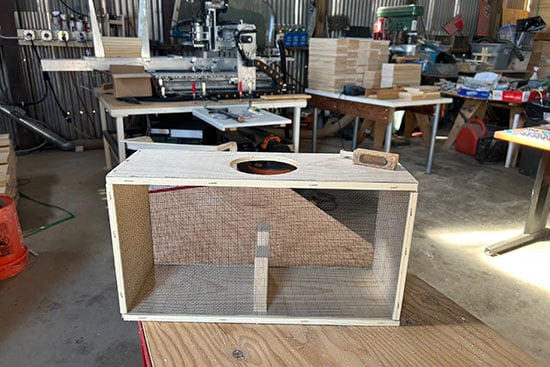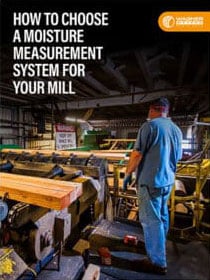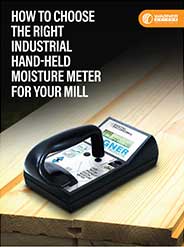How A+ Bee Packaging Used a Moisture Meter to Solve a Product Issue

A+ Bee Packaging makes a large box for the bee colony and a small box (on top) for the queen. The large box contains a 4-inch hole, which can be affected by changes in the wood’s moisture content.
Dick Matthews, owner of A+ Bee Packaging, manufactures shipping containers for bees out of Woodland, California. These containers are made of wood and contain a hole for a can of syrup that feeds the bees.
A couple years ago, Dick began receiving calls from the field with complaints that the hole for the can was either too tight or too big. The wood had shifted, which affected the dimensions of the hole and prevented effective transport of the bees.
What was going on?
Turns out, moisture content was the culprit. Keep reading to find out more about moisture’s effect on the wood and the way Dick solved the problem.
Wood Moisture Content’s Impact on Bee Shipping Boxes
Wood naturally adjusts to the moisture content of its environment, and as it does, its dimensions can shift, too. This property was affecting the bee shipping boxes.
Here’s how.
Dick makes the frame of his shipping boxes with 1×6 pieces of wood that have been split into two pieces. He places a fine screen over the two wide-open ends (see the picture). Then, he drills a four-inch hole into the top piece of the frame to hold a #2 can that will feed the bees syrup while they’re in transit.
Beekeepers take these shipping packages out in the field and shake the hives, pouring the bees into the shipping container through the four-inch hole. Once the container has 3,000 bees, they close it by putting the syrup can into the hole.
Unfortunately, moisture in the wood can have a big impact on that hole.
As Dick explains, “wood has a huge shrink rate from side to side versus end to end, so when we drill that hole through the wood, it can either shrink by almost a quarter of an inch or expand by almost a quarter of an inch.”
The hole might be the right size in the shop—snug enough for the can to fit and prevent bees from escaping. But sometimes, when the shipping container ends up out in the field, it can shrink or expand depending on the moisture in the environment.
When Dick started getting complaints from his customers about the hole’s size, he knew he needed to get to the bottom of the problem.
The Orion 950’s Role in Solving the Moisture Problem
Dick purchased an Orion 950 and began measuring the moisture content of the wood he was using for the bee shipping containers.
Up to this point, he’d used regular pine, and he noticed the wood’s moisture content could vary from 15 to 20%—a significant amount!
If the wood’s moisture content shifted after the boxes had been built, the syrup can hole would end up being too large or too small.
With the help of a moisture meter, he found that it was best for his wood to have a moisture content between 12 and 15% for his product. He also switched to purchasing a special kind of pine—radiata pine—from a lumber company that promised a stricter maximum moisture content. Radiata pine doesn’t experience as much movement from wood moisture as regular pine, so it has prevented the problematic shrinkage or expansion out on the field.
The result?
A more effective product and satisfied customers.
If you build products out of wood for your business, here’s how you can protect them from moisture and achieve the same results that Dick did.
Protect Your Wood Products with a Moisture Meter
As Dick Matthews discovered with his bee packaging, having wood with the right moisture content is key to a quality product. One of the best ways to ensure your wood has the right moisture content is to scan it with a wood moisture meter.
This way, you’ll know how close it is to the moisture content of its environment (the equilibrium moisture content), and you’ll be able to make your woodworking decisions accordingly.
Not only will your product function properly, but you’ll also increase your efficiency as a woodworker and reduce waste. Above all, your customers will feel confident in the quality of your work.
Reach out to us today and find out if the Orion 950 is suitable for your woodworking business.

Wagner Meters is a family-owned American business that aims to provide solutions in moisture measurement technology that will enhance the quality and value of each customer’s project. With an almost 60-year legacy of innovation, Wagner continues to be a resource for both individual craftsmen and high-performance commercial endeavors.
Last updated on March 17th, 2025



